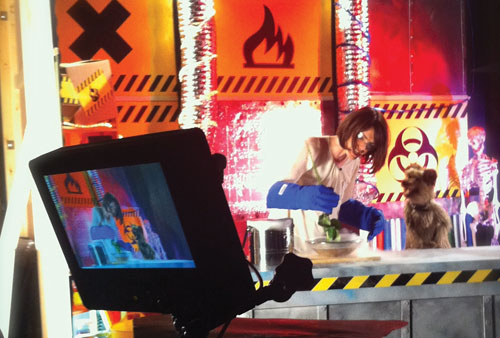
Science presenter Fran Scott with CBBC puppet Hacker T Dog. (Courtesy: CBBC)
By Matin Durrani
“Ever heard a child say ‘Yeah, I get it!’? Well, if you do, they’re lying. They’re only saying those words because you’re boring them and they don’t want to listen any more.”
That’s not me telling you – it’s Fran Scott, a BBC science presenter who has spent the last nine years involved in informal children’s science education, most recently working for Children’s BBC and BBC Learning.
Scott, who writes about her experiences in the March issue of Physics World magazine, finds “nothing more frustrating that the lazy communication of science”. And so, to help put things right, she has been involved in “many arms of science outreach”, including scientifically reviewing and advising on science books and also consulting on – and presenting – children’s science on the BBC.
In the article, Scott underlines how hard it is to really engage with children and distils her many years of experience into four golden rules. She advises you to remember them with the acronym “REAP”, claiming that they do reap great results. “I like rules,” says Scott. “They make you put the seemingly obvious into practice.”
Listed below are her four rules and a little bit about what they all mean, but to read the full article follow the links below.
Rule 1: Research – know the whole concept
Only by knowing as much as you can about the physics you want to explain can you interpret it and summarize it as a whole.
Rule 2: Extraction – select the key ideas
Boil down your knowledge to four to six bullet-pointed aspects, ideas or stories that together explain the whole principle you’ve researched.
Rule 3: Assimilate – boil down the ideas to one “learning outcome”
Collate your messages form rule 2 into one main idea that highlights the basis of all these principles.
Rule 4: Present – make your learning outcome engaging
Make your presentation entertaining, know what your audience knows, and do not use jargon unless you first explain it.
As Scott explains, if the rules may seem obvious, it’s because they are. But they’re not so obvious that everyone adheres to them.
Members of the Institute of Physics (IOP) can read Scott’s full article in the digital editon of the magazine or via the Physics World app, available from the App Store and Google Play. If you’re not yet a member of the IOP, you can, for a limited period, download a free PDF of the March issue of the magazine.
But remember that to get Physics World each month, simply join the IOP to get access via our apps or desktop version via this link for just £15/€20/$25 for 12 issues a year.
I will try to put in practice the four golden rules. Thanks France and Matin.
Professional scientists preparing Powerpoint presentations could learn a lot from these rules. Too often, though, one gets the impression they want to do a mind-dump to (a) show how smart they are (b) deter tricky questions by boring people to death.
Truly golden rules.